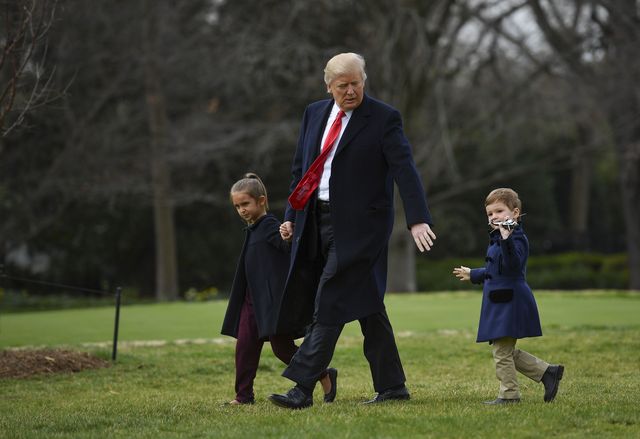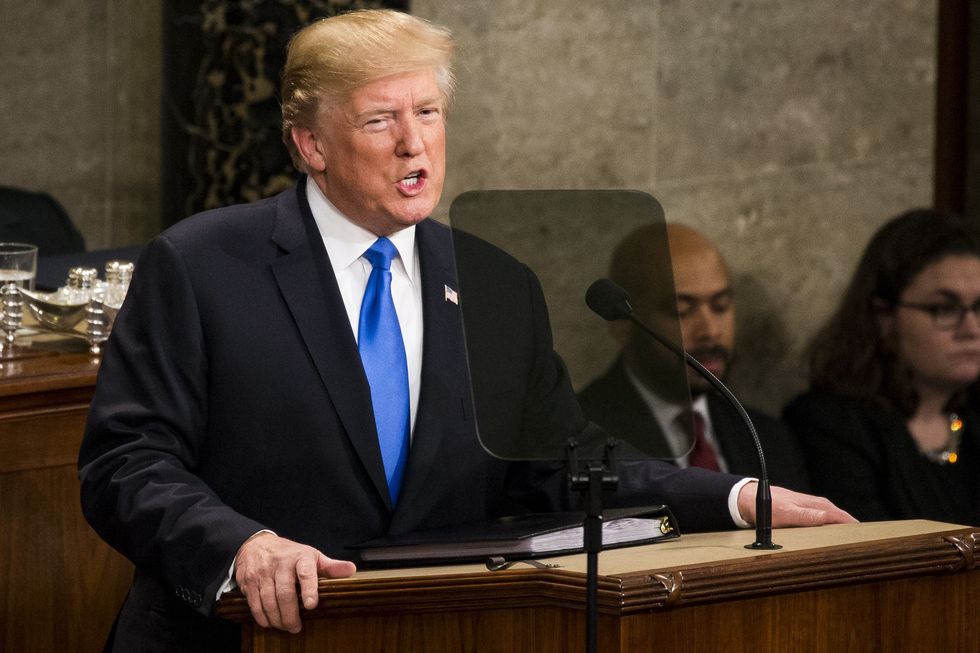It was a throwaway line, but still significant: last night during his first official State of the Union address to Congress, President Trump declared his support for paid family leave.
'Let's support working families by supporting paid family leave,' he implored.
It's not typical for presidents to say the words 'paid family leave' during their State of the Union addresses. President Obama embraced it in his 2015 State of the Union, four years into his administration, but it wasn't a big presidential issue before that point. Even for Democrats, the issue of family leave had been seen as fraught and even toxic for years. So to have a Republican president mention it is even more notable. Republicans have generally opposed enacting a national paid family leave program; even when Congress was working on enacting unpaid leave in the 1990s, former Republican Representative John Boehner called it 'another example of yuppie empowerment' and President George H.W. Bush vetoed it two times.
It would seem that most of the party still feels that way. While Trump's line drew applause from Democrats, his own vice president Mike Pence and Republican Speaker of the House Paul Ryan didn't clap.
But as notable as it was to have a Republican president use the words 'paid family leave' in such a high-profile speech, the likelihood that his words turn into meaningful changes for American families is basically nil. Most Republican lawmakers are not eager to take Trump up on the idea. And even if they did, the policy he's been backing falls far short of what families actually need.
Trump's line was almost certainly inserted at the behest of his daughter and White House advisor Ivanka Trump, who has been trying to make the case for a paid leave program with Republican lawmakers (although you might recall that she initially didn't offer her own employees any maternity leave at all). But even the words she snuck in were pretty weak. Trump could easily support the idea of paid family leave personally without enacting any actual policy changes.
And without changes, Americans generally can't expect paid family leave from work. Just 13 percent of the private sector is offered the benefit from their employers. We're the only developed country that doesn't guarantee paid maternity and paternity leave to all.
The details of the plan that Ivanka Trump has come up with, and that Trump included in his budget last year, wouldn't do a whole lot to change that picture. The program would guarantee that American workers could take just six weeks of time off to care for the arrival of a new child, whether through birth or adoption. That's a pretty short amount of time. A number of countries go a lot further—here in the United Kingdom we are guaranteed 40 weeks of maternity leave; Mexico and Iran ensure 12 weeks, similar to the 12 weeks of unpaid leave that Americans can take off to care for newborns, sick family, or themselves through the Family and Medical Leave Act. Over half of the countries that guarantee maternity leave ensure at least 14 weeks off.
Six weeks for someone who just gave birth, for example, would hardly cover the recovery period. Scientific research has found that it takes women somewhere between 12 and 16 weeks to bounce back mentally and physically. Children also benefit most from breastfeeding in the first six months. As more states have begun adopting paid family leave programs, the new additions have all gone further than the six-week mark.
And even if the Trumps' plan were viable, it would have a very bumpy road to reality. They propose running it through the existing unemployment insurance system, which is administered by states. The federal government likely couldn't compel states to add family leave to their systems, especially after the Supreme Court ruled against the Affordable Care Act's requirement that they expand Medicaid. So many states simply can't or won't. When President Bill Clinton issued a regulation that let states expand their unemployment insurance programs to cover paid parental leave, none of them ever actually took him up on it.
Meanwhile, many states have already failed to adequately fund their unemployment systems just for the existing benefits available to people who lose their jobs. They also often still rely entirely on paper or old coding languages, making it difficult to add additional demands on them.
States would also have to change their rules. The way things stand, employers are incentivized to have as few employees take advantage of unemployment insurance as possible, and their tax rates go up if more become eligible. It's a way to prod them not to fire people unless they really need to. But paid leave is different: there are benefits to having employees take it, and employers should instead encourage them to do so. Many states also currently have some tight restrictions on who's eligible—just over a quarter of unemployed people qualify, on average—and they frequently don't cover very much of someone's former paycheck, so a lot of people could be left out of Trump's paid leave program entirely.
The administration also hasn't been clear on where the money would come for the new benefits. Trump's campaign proposal said it would come from reducing fraud in unemployment benefits, but that's not very likely to be enough, even if he were able to root it all out. Instead, states might have to figure out how to cut back on unemployment benefits or increase their taxes to cover the cost.
There are other alternatives that would be a lot more workable. Democrats have repeatedly introduced the FAMILY Act, which would create a national paid family leave program based on the existing Social Security system. Just as with Social Security, all employees and employers would contribute a tiny share of their paychecks into a fund through a small tax. Then, when someone needed paid time away from work to care for a newborn, recover from an illness, or tend to an aging parent, she could draw on the benefits guaranteed to her by that fund for 12 weeks.
But so far no Republicans have gotten on board with that approach. Trump's embrace of the concept of paid family leave is significant and moves the politics of the issue a step forward toward bipartisan acceptance. But even Republicans who support it are still far from getting behind a plan that would actually offer relief to families who need it. His State of the Union was a nice sentiment, but Americans who are desperately trying to juggle work with caring for their families need a lot more than lip service from their president.















